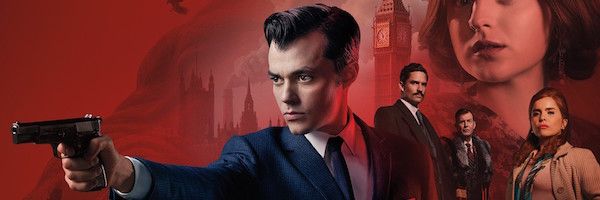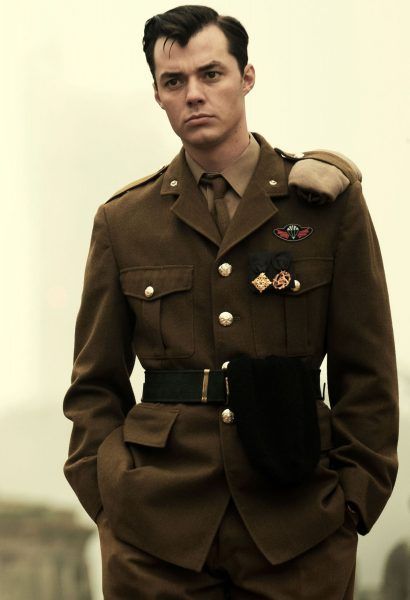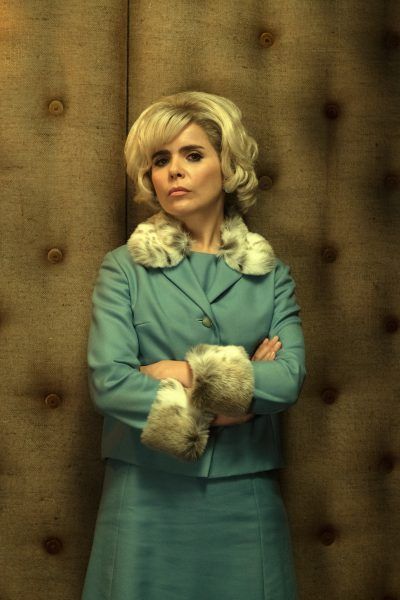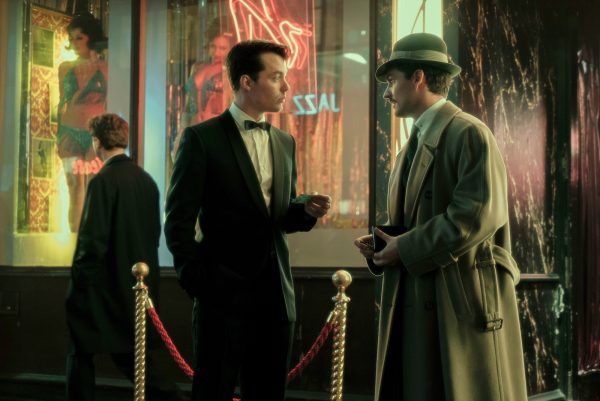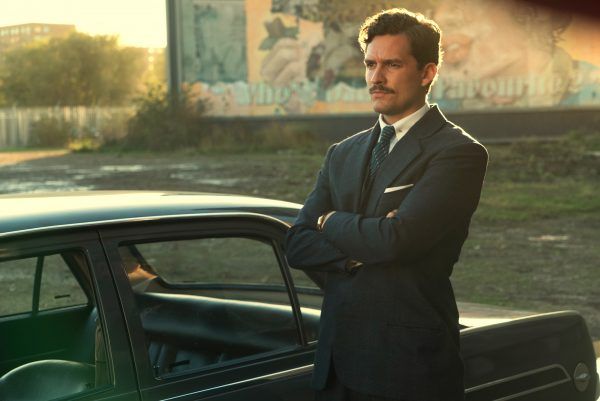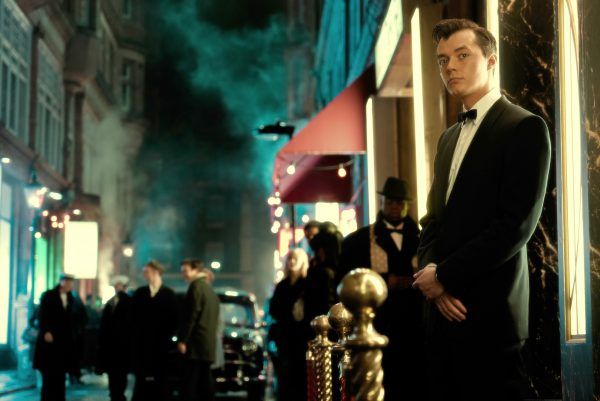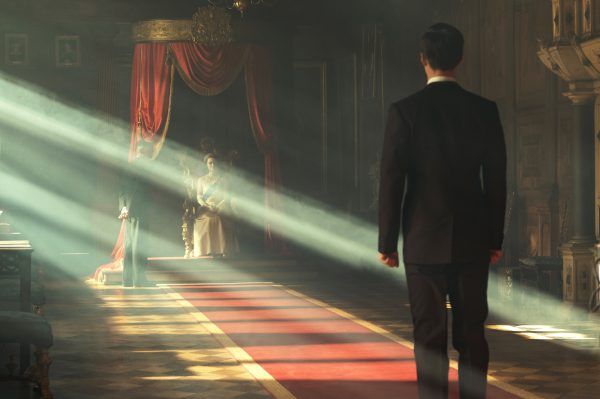From executive producer/writer Bruno Heller and executive producer/director Danny Cannon, and based on DC characters created by Bob Kane with Bill Finger, the 10-episode Epix drama series Pennyworth follows Bruce Wayne’s butler, Alfred Pennyworth (Jack Bannon), as a former British SAS soldier in his 20s who forms a security company and goes to work with Thomas Wayne (Ben Aldridge) in 1960s London. Not yet Bruce’s father, Thomas is a young billionaire from the East Coast of the United States, who finds himself in need of Alfred’s services, especially with a mysterious organization, known as the Raven Society, out there and causing all sorts of trouble.
During this interview with Collider, co-stars Jack Bannon, Ben Aldridge and Paloma Faith (who plays Bet Sykes, a sadistic and sharp-tongued foil) talked about the fun of exploring the origin of characters that people are already familiar with, getting to shake things up a bit, having the line between good and bad be more blurry, the over-exaggerated darkness to the series, the dynamic between Alfred Pennyworth and Thomas Wayne, not having been too familiar with the comic books, and their hope that the series will appeal as a drama and not just as a comic book show.
Collider: This is an interesting show because we get to learn so much more about Alfred Pennyworth and Thomas Wayne, who are two characters that we think we know, but clearly don’t really know, at all.
BEN ALDRIDGE: I think so, yeah. It’s quite exciting to know that we’re playing into the legend and the myth, and the following of those comics, and that we’re taking the fandom with us, but we’re starting at the origin point, which means that Bruno [Heller] has a huge scope to create what he wants, and then us, as actors within those roles, as well. It’s quite exciting.
JACK BANNON: Yeah, it’s very exciting. We know where all of these characters end up, which some people could see as restrictive, in the sense that they’re like, “Why do I wanna watch 10 hours when I know where he’s gonna end up.” We might know where they end up, but we don’t know how they got there. We’re playing with history, as it were. As much as there are descendants of Jack the Ripper, it’s also how these two met and how they end up at the end point. I don’t think people will expect some of the things that go on.
Paloma, is it fun to come in and be the one to shake things up?
PALOMA FAITH: I really like her. What’s interesting about the writing, and I haven’t really seen the previous Batman, and what I think is really clever is that, within the context of the TV show, you really get to explore the layers. There have been hundreds of people playing psychopaths. We’re looking into what lies beneath that and the profundity of almost being able to relate to her. All human beings have certain characteristics which unite us and make us the same. As a person who likes to think of themselves as a good and moral person, I sometimes relate to Bet. I sometimes feel empathy for Bet. I feel a fondness for her, and that’s good writing. I did a Masters in directing theater, and my course director said to me, “The greatest art form can be enjoyed from the mind of a child, with a basic level of entertainment and enjoyment, right up to the most profound intellectual. That’s how you grade great art.” And that’s what this show is trying to do. It’s fun to watch, on one level. It’s funny and exciting, but then it’s got lots of layers, and you, as the viewer, choose how deep you want to go. All of the characters have those layers, so it’s up to you, what you take from it.
When this came your way, did you knew exactly what this was? How much did they tell you, in the beginning?
ALDRIDGE: We got the script, so we all had a clear idea of the world they had set up.
FAITH: But it was just that one script.
BANNON: I don’t think we knew anymore about where it was going to head, beyond that, though.
There’s such a definite mood and tone to the show. Were you given any indication of that, at all?
ALDRIDGE: There was a big bit in the script that explained about the world, so yeah, to some degree. But visually, not so much.
FAITH: It’s got an over-exaggerated darkness.
BANNON: It’s fantastical. Being in it, I don’t think I’d quite gotten a handle on that, until I watched Episode 1. It’s really dark, quite funny, and it’s got a wit to it.
ALDRIDGE: The way that they’ve got the period coming across, it’s not just set there. The music and everything is evocative of that period, rather than it just happens that it’s set in the ‘60s. It feels like it’s not tied down by anything. It’s not really tied down by the period, it’s not tied down by the story, it uses different music in places, and anything can happen. We’ve got the license for anything to happen, believably, and that’s a good thing to be inside of because you don’t know where it’s going to go.
The longer you’ve played this character, are there things that you’ve come to appreciate about who she is?
FAITH: Yeah. I said to Bruno, “I’m worried because I think I love her.” And he was like, “Good. Great! I’m pleased, ‘cause I do, too.” She’s evolving. Because of the process of working on this, I don’t know the arc of my character. We don’t know where it’s going. It’s being written as we’re filming. It’s not a finalized thing. We’re exploring, and as we go on, and as we get to know each other on set and we build closer relationships, off-camera and on-camera, that’s all feeding into these characters becoming what they’re becoming. So, when people talk about playing with these pre-existing characters, it’s very natural, the process of it. It’s evolving, itself. I sense that the lines between who we are and who we’re playing may get blurry.
ALDRIDGE: I already feel like that sometimes.
FAITH: I’ll be like, “I don’t know where it came from, but I felt completely compelled to kill somebody’s dog today.” We’ve all felt that. There’s that great existential question of, “What are we all capable of doing? What can we be driven to do?” The Alfred character is very clever because we see him as a good man, and we see other characters as a bad person, but they’re inherently doing the same act. He’s killing people, but letting himself off and justifying it morally. As with the whole social construct of, what’s the difference between a soldier, a police man, and a terrorist? It’s a very blurred line, and there’s a lot of fear involved.
ALDRIDGE: I think the series is doing that on a whole, as well. What the comic books do, and the previous incarnations of the films, is have those two sides of good and bad. In Pennyworth, it’s not as clear as that. It’s not that there’s a good party and a bad party. The waters are more murky and muddy, and Bruno is doing a good job of not settling on who’s good or bad.
FAITH: He loves all of the characters. He cares about all of them. There’s a kindness behind all of them.
ALDRIDGE: Even the people that we perceive as the psychopaths.
Ben, what’s it like to play a character that we’ve only really known through his death?
ALDRIDGE: It’s quite weird. If I say to my friends, “I’m playing Batman’s dad,” they’re always like, “Oh, wow, cool. He’s dead though, isn’t he?” I know that’s how it’s going to end, if we get that far down the line. He’s just limited, nicely, to those flashbacks and to moments of him dying, so in a way, I’ve got creative license to do what I want with it. Well, Bruno has that license.
BANNON: It’s a bit like that for all of us, though, because none of this is in it. I hadn’t really read any of the comics. This part came up and I was like, “I better do my research and read all of the comics.” But then, I was like, “Wait a minute, I don’t because all of this happened before.”
ALDRIDGE: There’s a spin-off version of the comics, called Flashpoint, where Thomas Wayne becomes Batman before Bruce does, and I’m like, “Let’s go down that road. Let’s get to that part of it.” And then, there’s also another version of it, where Thomas Wayne goes to a fancy costume party, dressed as a bat, and ends up stopping some crime, per chance, in the street. That could be a little cheesy, but good foreshadowing of what’s to come. But Bruno won’t do that. He’s too tasteful.
What do you most enjoy about your characters, and their dynamic with each other?
BANNON: I love the fact that everyone should be a bit more Alfred.
FAITH: But stop killing people.
BANNON: Well, there’s that bit. But the thing is that I can sit here and convincingly say that everyone should be a bit more Alfred, and then, quite rightly, you highlight the fact that he’s killed people, so I won’t say that. He has to do some of that bad stuff, but ultimately for good. He tries.
FAITH: His intentions are always for the good, but it doesn’t always work out that way.
ALDRIDGE: I think that’s probably where they end up realizing that they have some common ground, as well. Thomas has his eye on the greater good, and on American ideals and everyone having a right to a good life.
BANNON: In the pilot, I’ve kidnapped you, but rather than sniveling and crying, you say, “Can you tell my parents?” And you’re like, “Who is this guy?” That’s the first moment where you’re like, “Okay.” But I don’t think they’re naive enough to not know that sometimes you have to get your hands messy.
What do you two guys think of each other?
ALDRIDGE: I think they’re quite suspicious of each other.
BANNON: We’re like two tigers, circling, to begin with. There’s a mutual intrigue, but also a suspicion.
ALDRIDGE: And they’re thrown together, completely by accident, with a perchance meeting in a car, and then another chance meeting in a kidnap. I think Thomas realizes that he actually needs Alfred. He’s in this land that he doesn’t quite know how to operate in, and he needs him for security purpose and for protection. He’s gonna enable him, so he ends up realizing that he could be an incredible asset.
BANNON: And by the same token, Alfred needs cash. It’s almost as crude as he presents everything that I don’t have, and I present everything that he doesn’t have.
ALDRIDGE: It’s opportunity, isn’t it?
Comic book and superhero shows and movies are so popular now. Are there people, in your own lives, that are excited that you’re a part of this show because of that?
ALDRIDGE: When we did a scene at the club, there was a background artist, an extra, who sat at the bar with me and was like, “Oh, my god, it’s so fuckin’ cool, you’re playing Thomas fuckin’ Wayne! What an amazing character!” His passion for it was the first time I’d heard that. None of my friends are really huge comic book fans. That was the first time I had seen someone get really excited about it. And actually, I went for dinner, and a friend of a friend at the dinner table was like, “What are you up to, at the moment?” And I told him. And he was like, “Yeah, shit, you kinda look like him, with the square jaw. I fuckin’ love the comics!” There are those people out there, where you get a reaction like that and you’re like, “Oh, yeah, I’m doing this thing that a bunch of people are really excited about.”
FAITH: I’m not somebody who’s ever been into comics, and I originally didn’t realize that was a prequel to Batman. It wasn’t until I saw the names that they seemed familiar to me, but I still didn’t really know. And then, when I went in and people told me that this was a prequel, I was like, “Oh.” It’s brilliantly done because it’s gonna be amazing, if you are a fan. It’s gonna color in and give some texture to some stuff that perhaps you haven’t thought about before. But then, also, I love it because I’m not a fan, but I don’t feel left out by it. It’s not like watching a soap opera where you’re like, “Who’s that person, and why are they talking to them? I wish I’d started this in 1982, which is as long as it’s been running for.” But you actually don’t really need to know anything about it. It’s not exclusively meant for people who are comic obsessed. It’s just good writing.
BANNON: The hope is that maybe people who weren’t interested in it before might be interested in this.
ALDRIDGE: Also, it’s going a lot deeper than those quick narratives do. It’s not as simple as good verus evil. The characters are super layered. It’s a character driven piece, so you can watch it like you’re watching a drama. It feels like that. It feels like a drama.
FAITH: The way we perform it and it’s directed as, it reads like a drama.
Pennyworth airs on Sunday nights on Epix.

